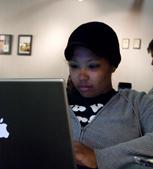It's 9:30 am. A student shifts her books aside, flips open her laptop, and gets ready for another stimulating lecture on political economy. As the professor winds through the topic of rent-seeking, the student finds herself a bit confused. No problem. She simply hits the pause key and rewinds to listen for a second time. As you might guess, this is not the traditional classroom. Welcome, instead, to the world of online learning at the University of Washington.
A college education has always involved the transference of knowledge from one generation to the next. Along the way, students develop the critical thinking skills needed to challenge the ideas presented to them and forge new ways of thinking about the world. Ever since the 12th century when modern universities first appeared in Europe this process has occurred in a classroom with both students and faculty present.
This model is changing. In the 1990s, laptops began appearing on student desks (ostensibly to take notes during lecture) and the occasional professor would use teleconferencing technology to beam in a lecture from a colleague in another part of the country. But with the rapid development of the Internet over the past decade, the four walls of the traditional lecture hall have crumbled paving the way for students to take familiar courses at their own convenience.
Over the past several years, the UW has dipped its toes into the online education world and has a major initiative in the works to expand this form of learning exponentially over the next five years. Professor Anthony Gill was the first full-time faculty member in the Department of Political Science to try out this method, turning his popular Introduction to Political Economy course into something students could take while sitting at their kitchen table at midnight.
Using Adobe Presenter software, Professor Gill transformed his usual PowerPoint slides into short movies with accompanying narration. Each lecture is roughly 40-50 minutes long, much like a traditional lecture, but students can pause, rewind and review the material at their leisure, a major benefit for students who may have difficulty understanding some of the material.
Professor Gill augments these lectures with online podcasts from other professors around the country, with EconTalk being one of his favorite venues. The fact that a student can hear and learn from a discussion between two professors via the podcast format has inspired Professor Gill to create his own weekly podcast series entitled Research on Religion. “I find that podcasts are a great way to reach students as they can listen in on conversations between two academics and hear how ideas are debated,” Professor Gill notes. “The cost of making and using podcasts has dropped dramatically over the past few years. It enhances the online education environment by making you feel that you are part of a discussion with others. The online world is not isolating, but encapsulating when used correctly.”
While taking an online course may appear to be an easy way to get a good grade, Professor Gill retains the rigor of his “live” course by requiring students to turn in weekly assignments, participate in discussions via blogs, and even take written exams that are coordinated at different locations twice each academic term. “One of the biggest dangers of an online course is that it may appear deceptively easy to a student at first,” he warns. “However, an online course requires a high level of self-discipline from the student. Without a regularly scheduled meeting, students can quickly fall behind.”
Working students who cannot easily fit the traditional campus courses into their busy schedule benefit enormously from the online format. This has allowed a number of students who may otherwise have dropped out to continue pursuing their degree. Indeed, the UW has prioritized finding students who left the university before completing their degree and connecting them with the online education program in order to help them reach their goals.
There is little doubt that online education will become an increasingly important component of collegiate life. The Department of Political Science, thanks to pioneers like Anthony Gill, Robin Datta, a lecturer who offers an online course in foreign policy, and Jack Turner, who is currently developing an online political theory course, is embracing this changing environment.
And so today, while some student sits at her kitchen table pausing and rewinding a lecture, the Political Science faculty and staff are pushing the fast forward button.
A free peak at Professor Gill’s online course can be found at the website below. Click on the “modules” section of the webpage to see the actual lecture content.
https://uw.instructure.com/courses/302154
Professor Gill’s weekly podcast series Research on Religion, which is free to the public, can be found here:
http://www.researchonreligion.org
Anthony Gill is Professor of Political Science and host of the weekly podcast series, Research on Religion (www.researchonreligion.org). His most recent book is The Political Origins of Religious Liberty (Cambridge University Press, 2008).
